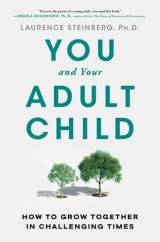Before Laurence Steinberg started writing his latest book, he poked around on Google to examine the literature on parents of adult children. What he found surprised him. Most books were about estrangement, what most would consider a semi-permanent rupture between parent and child. As for the everyday fears that plague many mothers and fathers of adult children — over their kids’ apparently unhurried educations, leisurely careers, and foot-dragging with romantic partners — there was little to nothing. The Temple University professor of psychology and neuroscience who has studied young adults for decades decided that anxious parents would benefit from a closer look at the mysterious young adults in their midst. “You and Your Adult Child: How to Grow Together in Challenging Times,” published in April, is a comforting reality check that many of us need.
 “Delayed adulthood is a sociological phenomenon, not a psychological one; it’s a reflection of structural changes in the economy, the labor force and education,” Steinberg told me. Young adults do take longer than before to establish complete independence — about five years later than the prior generation. But there’s no evidence to support the notion that this delay is a signal of psychological distress. Indeed, settling more slowly into careers and family life makes sense when considering the cognitive development that’s occurring among those in their early 20s. Neuroscientists have figured out that the young adult brain is highly malleable and receptive to its environment. Young adults are growing and learning well into their 20s, meaning that the right challenges and experiences during this time will contribute to their development.
“Delayed adulthood is a sociological phenomenon, not a psychological one; it’s a reflection of structural changes in the economy, the labor force and education,” Steinberg told me. Young adults do take longer than before to establish complete independence — about five years later than the prior generation. But there’s no evidence to support the notion that this delay is a signal of psychological distress. Indeed, settling more slowly into careers and family life makes sense when considering the cognitive development that’s occurring among those in their early 20s. Neuroscientists have figured out that the young adult brain is highly malleable and receptive to its environment. Young adults are growing and learning well into their 20s, meaning that the right challenges and experiences during this time will contribute to their development.
Steinberg debunks several established myths about older children that can preoccupy their parents. Consider marriage: As with other markers of young adulthood, marriage happens later than it ever used to — usually at age 30 for men and 28 for women — but does occur eventually for many people. Among individuals ages 33-44 in the top 40% of the income bracket, almost 80% are married — a similar number to their predecessors 40 years ago. While marriage is less common among lower-income couples, 15% of 25- to 34-year-olds live with a partner. Indeed, 75% of couples who got married from 2015-2019 cohabitated first. There’s no need to fret over your happily unhitched older child: Many will marry eventually. “If I can help parents feel reassured that the world isn’t falling apart if their 30-year-old isn’t married, that will be valuable,” Steinberg told me.
Parents also worry about their kids’ delay in graduating from college and slow walk to finding a remunerative job. Why the dithering? Steinberg explains that the “four-year degree” is largely mythology: 40% of college freshmen never graduate, and those who do often take five or even six years to finish — a function, in part, of increasingly complex university degree requirements that tack on an extra semester or three. As well, graduates often find that potential employers expect their new hires to be learned in specialized skills that require even more training, further slowing their entry into the world of work. “It takes kids longer to get into their career,” Steinberg said. Also complicating matters, all the lead up to gainful employment often means kids remain financially dependent on their parents well into their 20s, or even beyond.

If parents of older children want to ease tensions over some of these concerns, they might shift the way they think about and respond to their kids’ path to adulthood. The first rule is to avoid ponderous comparisons between your own (faster, tidier) route to maturity and your child’s; “when I was your age,” is a conversation killer. Also, when considering whether to weigh in about your child’s job search, partner, finances, social media use, housekeeping (the list goes on), adopt a variation of the Hippocratic Oath: first, do no harm. As Steinberg puts it, “Speak up when you must, but unless your child specifically asks for it, keep your opinion to yourself.” Such discretion may not come naturally to a generation of parents who have been hovering anxiously over their children since birth. But stepping back and staying mum is the way to give your adult kids space to make their own decisions. It also signals that you have faith in their ability to figure out their own lives. And when young adults do snap back at a well-intended suggestion to just send an email about job possibilities to a well-connected friend, try not to take it personally. Advice from parents can feel like an attack on their competence and ability to manage independently.
To be sure, some young adults are floundering, and do need concerted support from their parents. To protect against a mental health crisis, parents should continue to provide love and support into their child’s adulthood, especially when their kids are under stress. They also might try to step in occasionally to offer practical support — babysitting, a dinner out or even a loan if money is the problem. Without being intrusive, they should encourage their grown kids to find ways to reduce stress. Finally, information about possible genetic inheritances that can make their offspring susceptible to alcoholism or mental illness should be discussed sensitively but clearly.
There’s one more myth Steinberg explodes: Despite the glut of books with dire warnings about estrangement, such breaches are atypical in households where parents and kids have largely gotten along. The term itself is poorly defined, and varies from book to book; some classify temporary spats and disagreements between siblings as parent/child estrangement. Parenting books often talk about the bad side of things, Steinberg said. About adult kids, he added, “they want you in their life.”